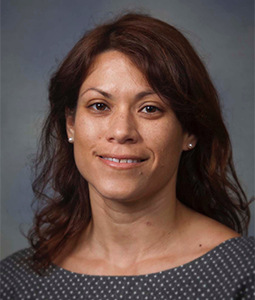School of Medicine Columbia
- SC.edu
- Study
- Colleges and Schools
- School of Medicine Columbia
- About
- Faculty and Staff
- Kandy Velazquez
Faculty and Staff
Kandy Velazquez, PhD, FACSM
| Title: | Associate Professor |
| Department: | Pathology, Microbiology & Immunology School of Medicine Columbia |
| Email: | Kandy.Velazquez@uscmed.sc.edu |
| Phone: | 803-216-3421 |
| Office: |
Basic Science Building 2, Room C5, Lab: C21 |

Education
University of Puerto Rico - Mayaguez Campus, B.S., 2002
University of Puerto Rico - Medical Sciences Campus, M.S., 2006
University of South Carolina - Arnold School of Public Health, Ph.D., 2012
University of South Carolina - School of Medicine Columbia, Postdoc, 2019
Biography
Dr. Kandy T. Velázquez leads a translational research program centered on understanding the neuro-immune mechanisms driving cancer-associated pain and cachexia. Her laboratory investigates how colorectal cancer, colitis, and chemotherapy contribute to visceral and neuropathic pain, focusing on the interactions between the nervous and immune systems that sensitize pain pathways.
A second major focus of her lab examines cancer cachexia, a debilitating metabolic syndrome characterized by severe skeletal muscle wasting that reduces patient quality of life and treatment tolerance. Dr. Velázquez’s team is particularly interested in the role of platelets and macrophages in regulating muscle inflammation and atrophy during cancer progression and treatment. By studying when and how these immune cells become dysregulated, her group seeks to define the cellular and molecular mechanisms that initiate and sustain cachectic muscle loss.
Her research further explores herbal and nutraceutical-based therapeutics as potential interventions to alleviate cancer-related pain and cachexia.
Teaching Interests
Dr. Velázquez is deeply committed to training the next generation of biomedical scientists and physicians through integrative and inquiry-based learning. Her teaching interests lie primarily in medical microbiology, physiology, and pathophysiology, with an emphasis on connecting molecular mechanisms to clinical outcomes.
She also incorporates active learning strategies—including case-based discussions, research-based projects, and educational games—to promote critical thinking and student engagement. At the graduate level, Dr. Velázquez mentors students in experimental design, data interpretation, and responsible conduct of research, particularly in areas related to inflammation, cancer biology, and neuroimmunology.
In addition, she is passionate about fostering a positive research environment and culture, helping trainees develop the professional and interpersonal skills needed for successful scientific careers.